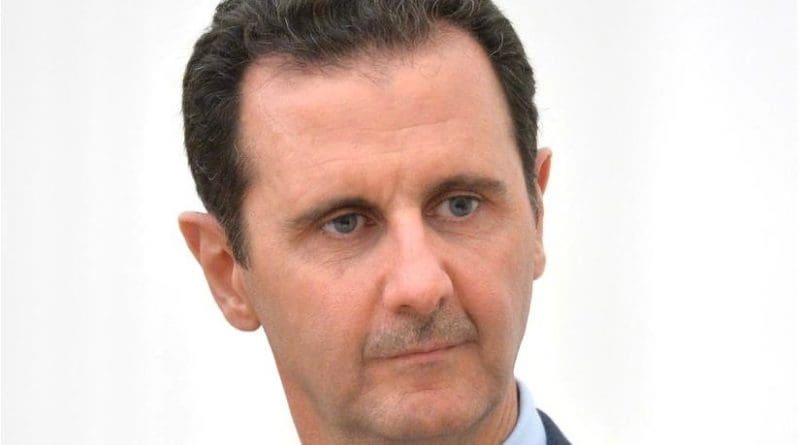Syria: Rounding Up Protest Leaders As Crackdown Continues
By RFE RL
(RFE/RL) — Rights activists in Syria say the country’s security forces are continuing a town-by-town crackdown on dissent — with troops involved in a mass round-up of opposition leaders a day after launching what is being described as one of the most brutal waves of repression since uprisings began across the Arab world earlier this spring.
On May 11, at least 19 civilians were killed by government troops and gunmen in cities that have been hubs for protests. The crackdown has included the deployment of tanks that on May 11 shelled the industrial city of Homs, Syria’s third-largest, near the Lebanese border.
Residents say black-clad security forces and plainclothes police wearing bracelets to identify themselves have lists of people who have taken part in antigovernment protests and were searching house to house to detain them.
Today’s arrests also come after thousands of students staged a demonstration overnight in Syria’s second city, Aleppo. Defying the government crackdown, the students eventually were dispersed by security forces and baton-carrying loyalists of Assad’s regime.
Rami Abdul Rahman of the London-based Syrian Observatory for Human Rights says the army also is continuing today to round up protest leaders in the Mediterranean town of Banias. Syrian soldiers and tanks reportedly surrounded the city of Hama, as well.
Assad Blames ‘Islamists’
Assad’s government has admitted it’s carrying out a crackdown, but describes the military’s targets as militant Islamists. It says Syria’s security forces are responding to an uprising by “armed terrorist gangs.”
Syria’s army says two of its soldiers, including an officer, were killed and nine wounded in clashes on May 11 in Homs and the city of Daraa, where Syria’s uprising began seven weeks ago.
Human rights groups say more than 600 people have been killed and at least 8,000 arrested since the start of the protest movement in mid-March.
The protesters are demanding free elections, the release of political prisoners, and constitutional changes that would strip Assad’s ruling Baath Party of its hegemony over the country.
Damascus Condemned
There is growing international condemnation of Syria’s government.
United Nations Secretary-General Ban Ki-moon said in Geneva late on May 11 that Assad should heed the calls of the Syrian people for reforms and freedom. Ban also called on Damascus to desist from “excessive force or the mass arrests of peaceful demonstrators.”
“We continue to press the Syrian authorities to grant access for the United Nations to be able to [carry out] an independent and impartial assessment of the situation in Daraa and other cities affected by the recent violence and to plan a response and necessary humanitarian assistance,” Ban said
The European Union’s foreign-policy chief, Catherine Ashton, said today that the EU had left the door open for extending sanctions against Syria to include Assad.
On May 10, the EU put 13 Syrian officials on its sanctions list — including a brother of Assad — in a first step aimed at forcing Syria to end the violence. The asset freezes and travel bans against those officials were part of a package of sanctions including an arms embargo,
In an interview broadcast on Austrian radio today, Ashton said that although Assad was not on the sanctions list yet, EU foreign ministers would return to the issue later this week and reconsider calls by France to add the Syrian president to the blacklist.
Regime ‘Not Legitimate’
Former Syrian Vice President Abdel-Halim Khaddam, who fled the country in 2005, told Reuters in Brussels after the deadly May 11 crackdown that Assad “is doing what [Libyan ruler] Muammar Qaddafi has done.”
“At some point, an intervention might be needed. The people are being killed,” Khaddam said.
“A regime that kills its own people is not legitimate. In fact, they are enemies of their own people and therefore they will not gain national legacy,” he added. “The national legacy will demand the getting rid of [the leadership] by any means.”
Khaddam said he thought the number of deaths in Syria is “largely underestimated.” He said more than 2,000 protesters had been killed across the country in the past seven weeks.
With hundreds listed as missing, he said he thought many have been killed by government troops and that the regime has “made their bodies disappear.”
U.S. Worries Of Wider Chaos
U.S. Secretary of State Hillary Clinton today condemned the repression in Syria, calling it “a brutal crackdown.” Speaking at a conference in Greenland, she said Syria’s use of force is “a sign of remarkable weakness.”
In Washington, the U.S. State Department denounced the crackdown as “barbaric.”
Spokesman Mark Toner said the Syrian authorities “continue to extend their violent actions against peaceful demonstrators” with “arbitrary arrests, the denial of medical care to wounded persons, and inhuman conditions for detainees” that “amount to collective punishment of innocent civilians.”
Toner also said Syria was running out of time “to shift focus from its outright repression towards meeting the legitimate aspirations of its people.”
Analysts say U.S. President Barack Obama’s administration has been reluctant to call for an end to Assad’s increasingly violent and repressive regime out of fears that a revolution in Syria could bring chaos to a part of the Middle East with serious repercussions for Lebanon, Iran, and Israel.

